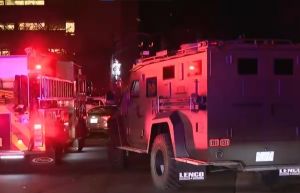Dead bodies of Ebola-infected victims are being left on the streets after Ebola burial teams in two districts of Sierra Leona went on strike for not being paid their weekly risk allowances, leaders of the group said on Tuesday. Similarly in Liberia, one of the hardest hit countries by the Ebola epidemic, thousands of health workers and local staff are threatening to strike starting Monday if they don't receive hazard pay.
The Ebola team workers, who arguably have one of the world's most dangerous jobs, have complained that they have not been paid since the past two weeks. But leaving dead bodies on the streets and stopping work might prove extremely dangerous since the highly infectious virus tends to remain in the corpses of victims, with only specialized teams in protective clothing being able to dispose the bodies, NBC News reported.
Since the regional Ebola outbreak, at least 348 health workers have been infected with the disease and 186 have died, half of the cases being in Liberia, according to the World Health Organization.
"We have decided to stop working until they pay us our weekly risk allowance," Tamba Nyandemoh told Reuters.
"We haven't been paid for two weeks, so we need our money right now," said one angry worker, according to Sky News.
"We don't even care if dead bodies have been littered all over the city - all we want is our money. We've been stigmatized in our communities, so let the government pay us our money."
Comprising of 12 workers in each burial team, between 17 and 35 bodies are buried daily, with each member earning $100 a week, Nyandemoh said.
The situation is "very embarrassing", said health ministry spokesman Sidie Yahya Tunis. However, the teams were only owed payment for this week and had been paid through the end of September, Sierra Leone deputy health minister Madina Rahman said, declining to comment of the team's demand for risk pay.
Separately in Liberia, approximately 15,000 members have been asked to stay away from work starting Monday, October 13, by the Liberian Health Workers Association, who is demanding hazard pay, benefits and safe working conditions, George Williams, the union's secretary general, said.
"What we take home is insufficient for the kind of risk and the kind of jobs we do. That we have told our government from time immemorial. Nobody seems to listen to this," he said.
Additionally, the union is demanding monthly salaries ranging from $500 to $1,500 depending on the jobs being performed in Ebola treatment units. However, the government claimed it doesn't have the money to pay them, Voice of America reported.
The Ebola outbreak started in Guinea's remote southeast in February and has since spread across the region. Since it was first recorded in 1976 in what is now Democratic Republic of Congo, more than 3,400 people have died in the outbreak from more than 7,400 infections in Liberia, Sierra Leone, Guinea and Nigeria.
Symptoms of the highly infectious disease are diarrhea, vomiting and internal and external bleeding.
© 2025 HNGN, All rights reserved. Do not reproduce without permission.








